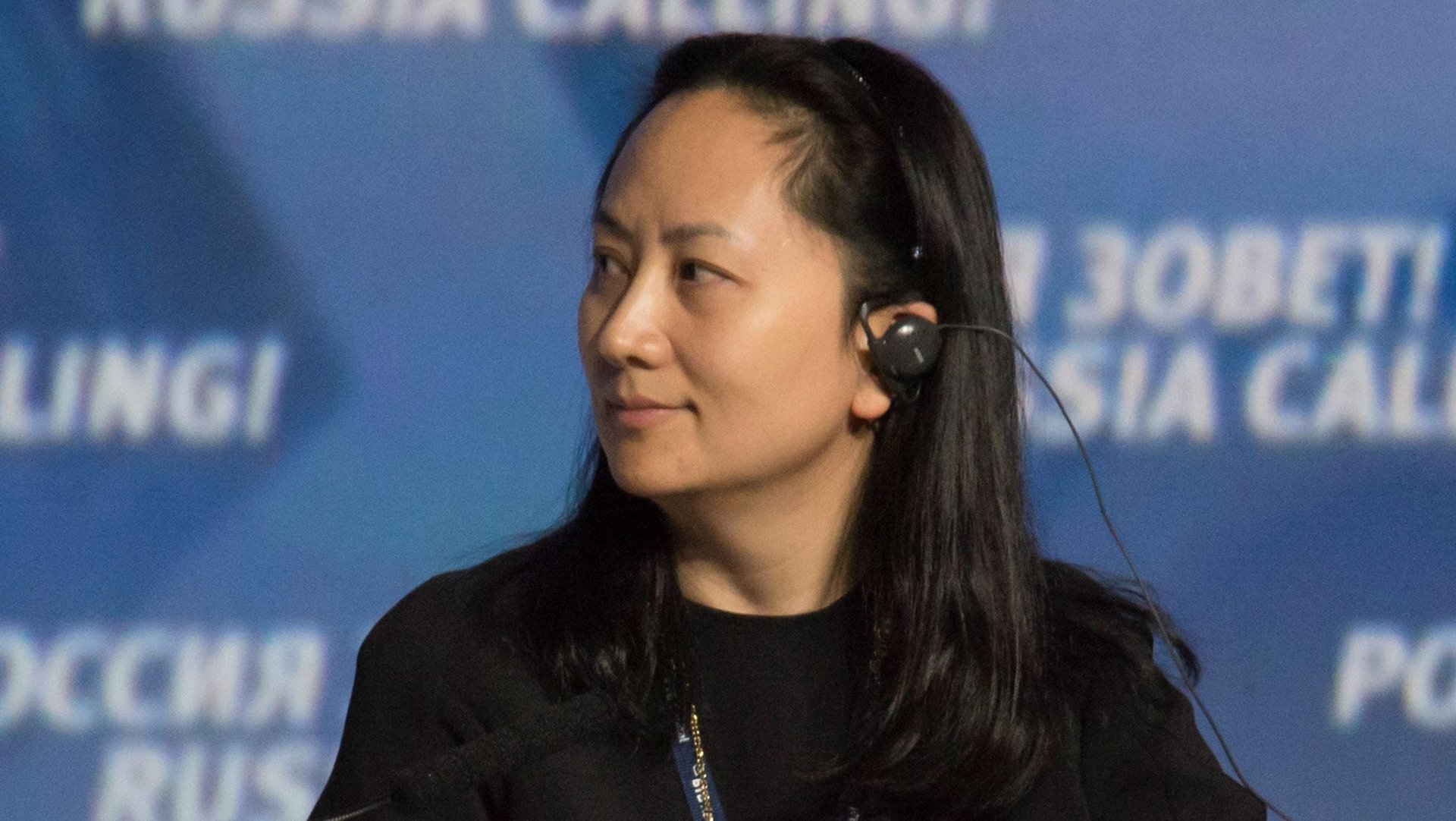The US and Canada are signalling there won’t be a reprieve for Huawei’s executive yet
With less than 10 days to go before a deadline to seek the extradition of Huawei executive Meng Wanzhou, the US is on the verge of submitting a formal request for her, Canada’s top diplomat to the US has said.


With less than 10 days to go before a deadline to seek the extradition of Huawei executive Meng Wanzhou, the US is on the verge of submitting a formal request for her, Canada’s top diplomat to the US has said.
Meng is the chief financial officer for Chinese telecom giant Huawei, and also the child of its founder Ren and CEO Zhengfei, who has made two rare back-to-back media appearances since his daughter’s surprise arrest in Vancouver on Dec. 1. Canada said it held Meng at the request of US authorities on suspicion of violating US sanctions on Iran. Huawei has said it follows the laws and regulations in the countries in which it operates.
Late Monday (Jan. 21), Canadian newspaper the Globe and Mail (paywall) quoted David MacNaughton, Canada’s ambassador to the US, saying Washington had told the Toronto it would proceed with the formal request. The Canadian and US justice departments didn’t immediately respond to queries sent during the Asia day. Meng, who was granted bail, is due back in court Feb. 6—right in the middle of the all-important Chinese New Year holiday.
Soon after Meng’s arrest, president Donald Trump said in an interview with Reuters that he could intervene in Meng’s case if it helped get the US a better trade deal with China. In China, suspicion already exists that the Huawei arrest is another effort by the US to contain China, much like the tariffs imposed on billions of dollars in Chinese goods by the US last year. But from China’s perspective, the president having some discretionary power around what happens next isn’t entirely negative.
In fact, there are several key points in extradition process where the US or Canada could fail to act, which would allow Meng to be released.
For example, if the US for some reason didn’t end up submitting a formal request by the 60-day mark—which falls right around the time when a delegation led by Chinese vice premier Liu He is to arrive in Washington for more trade talks—Meng can be released. Once a formal extradition request is submitted, the onus shifts to Canada: It then has 30 days to decide whether the extradition hearing should proceed or not—if it doesn’t issue authority for a legal extradition to proceed in that time frame, then too Meng could be released. It’s also possible to request an extension of these deadlines.
While China’s official stance after the arrest was to say there was no connection between the two developments, it has been trying hard to cultivate the US, from buying more of its soybeans to reducing the car import duties it raised during the tit-for-tat tariff rounds. Meanwhile, Canada’s been having quite a different experience with China.
Soon after Meng’s arrest, Canada detained Michael Kovrig, a former diplomat, and Michael Spavor, a promoter of ties between the West and North Korea, and multiple other Canadian citizens. Almost 120 scholars and former top diplomats have signed an open letter this week to China’s president Xi Jinping requesting the release of Kovrig and Spavor.
The Canadian ambassador said he had conveyed his country’s unhappiness to the US over the detentions. ”We don’t like that it is our citizens who are being punished,” the ambassador told the Globe and Mail. “[The Americans] are the ones seeking to have the full force of American law brought against [Ms. Meng] and yet we are the ones who are paying the price. Our citizens are.”
The news of a possibly imminent extradition request is just the latest round of trouble for Huawei. Just two weeks into 2019, Huawei’s Poland sales director was arrested on suspicion of spying for China, while Germany signaled it is considering whether to exclude Huawei from its 5G rollout. Europe is a key market for Huawei, whose gear is quite unwelcome in the US after a House panel in 2012 warned (pdf) that using its technology could pose a national security risk.
Given the unwanted spotlight, Huawei’s usually reclusive founder and CEO Ren has engaged in an “unprecedented media blitz,” Reuters noted, appearing in a half-hour interview on state broadcaster CCTV just days after speaking to journalists at Huawei’s headquarters.
Ren claims that he’s not worried about expanding global restrictions on Huawei’s technology as countries roll out 5G. “It would be stupid on their part if they don’t buy. It would be their loss… For a lot of European and American countries, they will have to buy [our products], and I will definitely sell the products to them. I won’t mind that they have once rejected us. I think we are market-oriented. We are customer-centric,” the 74-year-old said in the CCTV interview.
When asked by the state broadcaster, what he wanted to do for Meng, Ren said he would “thank the [Communist] Party and the country for the protection of a citizen’s rights, and I am counting on the power of law.”